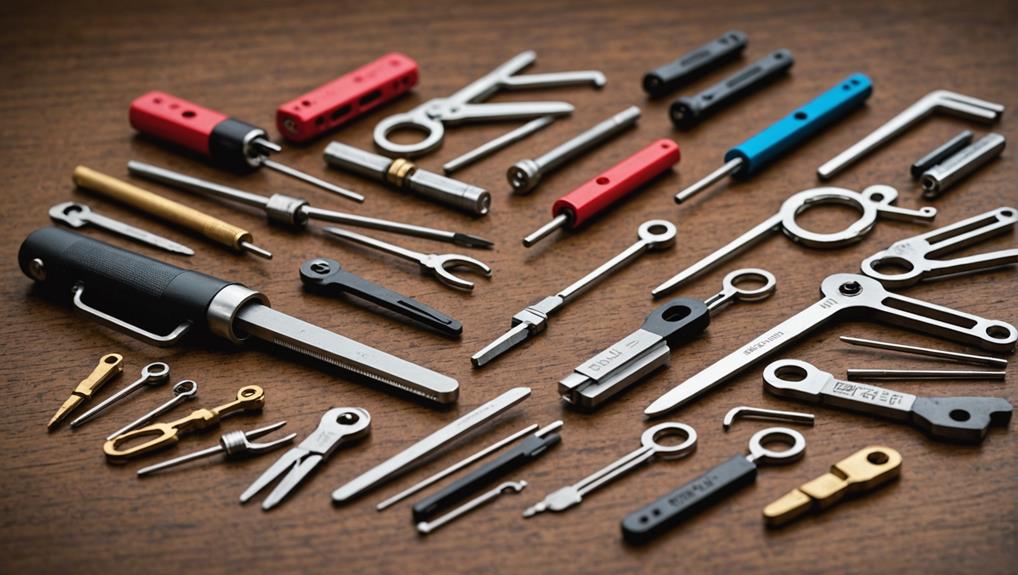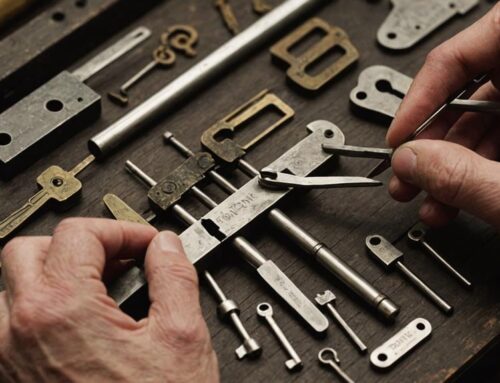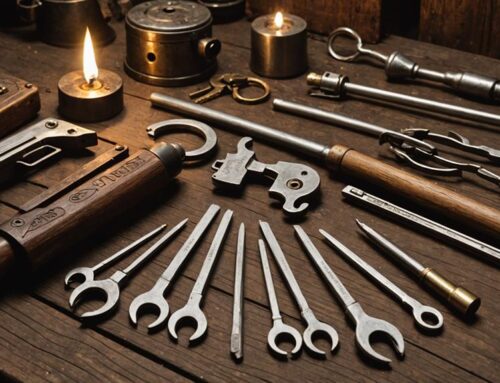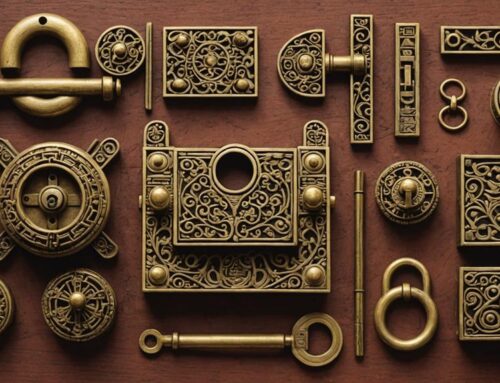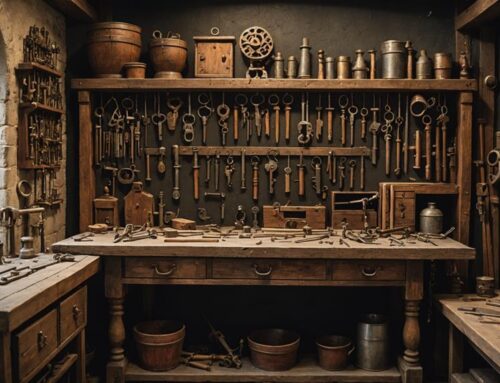To choose the best lock picking tools for your skill level, start with essential tools like hooks, rakes, and tension wrenches for beginners. Quality matters, so opt for durable materials that enhance learning. For intermediates, consider materials like stainless steel or titanium and balance complexity with ease of use. Experts should focus on precision and durability with a variety of tension wrenches and picks. Remember, versatile tools are key, and compact kits offer portability. Price shouldn't be your only factor; quality tools last longer. Understanding lock mechanisms is the foundation for improvement in all skill levels.
Key Takeaways
- Start with a basic lock pick set for beginners.
- Consider tool materials based on performance needs.
- Assess skill level to select appropriate tool complexity.
- Prioritize precision and durability in expert tools.
- Focus on quality, essential tools over quantity for better value.
Beginner Lock Picking Tools Recommendations
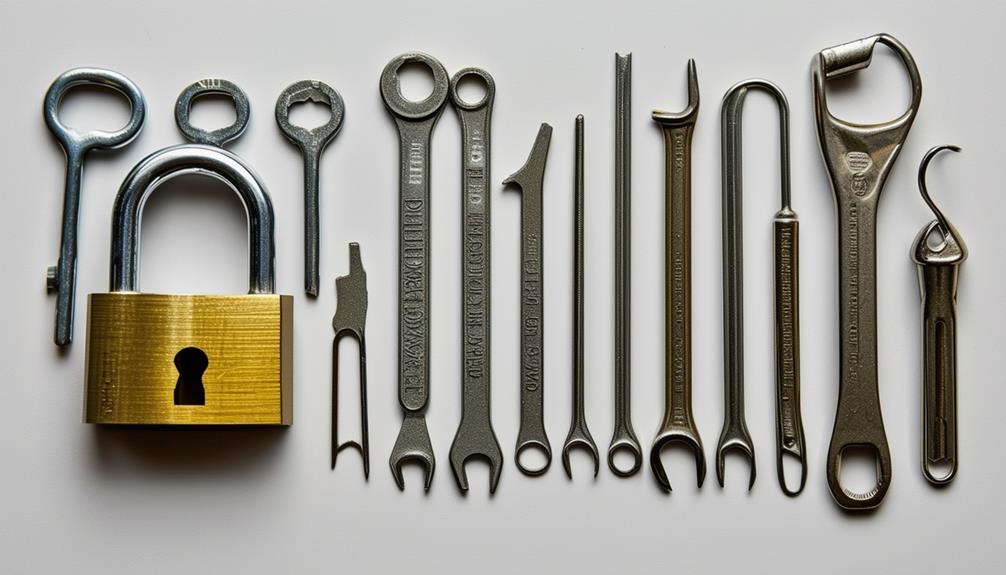
When starting out as a beginner in lock picking, it's vital to have the right tools at your disposal. For lockpicking for beginners, the most important tool is a basic lock pick set.
These sets typically include a variety of picks, such as hooks, rakes, and tension wrenches. The hook picks are great for single pin picking, while rakes can help with quickly manipulating multiple pins. Additionally, many experts recommend investing in high-quality tools, as they can enhance your learning experience and improve your success rate.
Tension wrenches are essential for applying the necessary pressure to turn the lock once the pins are set. You can find important tools that lock picking experts rely on to further enhance your toolkit.
Additionally, having a clear practice lock can be immensely beneficial for beginners. Practice locks allow you to see the inner workings of a lock as you pick it, helping you understand the mechanics better.
They provide a hands-on learning experience that can accelerate your skill development.
Intermediate Lock Picking Tools Suggestions
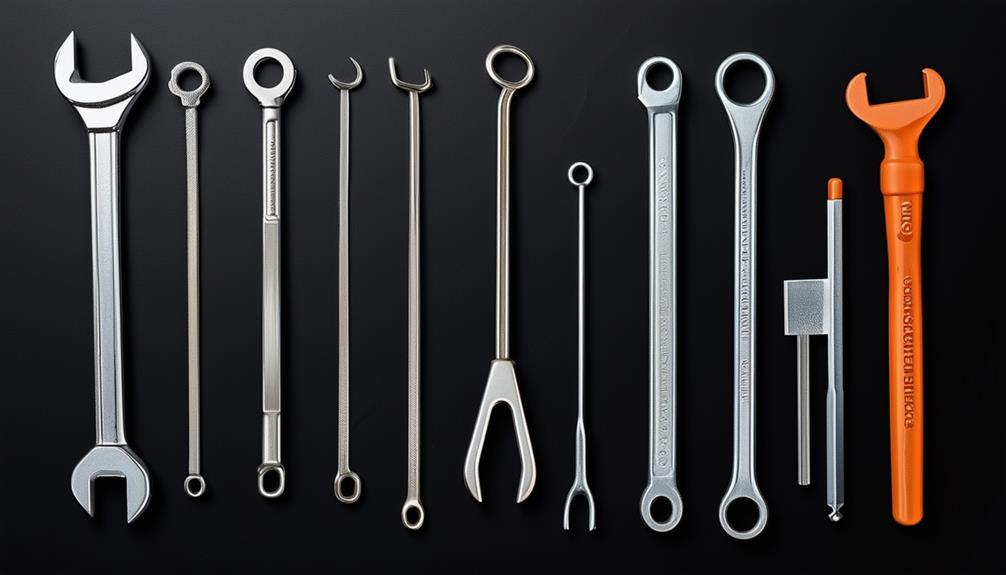
Now that you've mastered the basics, it's time to explore intermediate lock picking tools to enhance your skills.
Consider different tool material options, as they can affect your performance; for example, high-quality steel tools can provide better durability and precision in your picking efforts.
Additionally, understanding essential lock picking tools can help you make informed decisions.
Balancing complexity with ease of use and staying within your budget are essential factors to keep in mind.
Tool Material Options
Exploring the domain of intermediate lock picking tools leads you to reflect on the various options in tool materials.
When choosing lock picking tools, the material they're made of can greatly impact their performance and durability. Here are some common tool material options to keep in mind:
- Stainless Steel: Known for its strength and resistance to corrosion, stainless steel tools are durable and suitable for regular use.
- Spring Steel: Flexible and robust, spring steel tools are great for maneuvering through complex keyways and providing feedback while picking locks.
- Titanium: Lightweight yet strong, titanium tools are ideal for precision work and reducing hand fatigue during prolonged lock picking sessions.
- Carbon Fiber: Offering a good balance of strength and lightness, carbon fiber tools are excellent for delicate lock manipulation and intricate tasks.
Each material has its own strengths and weaknesses, so it's crucial to choose the one that best suits your needs and preferences when selecting intermediate lock picking tools.
Complexity vs. Ease
As you explore the domain of intermediate lock picking tools, the balance between complexity and ease becomes an essential factor to contemplate when making your selection.
When it comes to the best lockpicking tools for intermediate users, striking a balance between the two is vital. Opt for tools that offer a bit of a challenge to enhance your skills while still being manageable to work with.
Consider investing in hook picks, which are versatile and effective for single-pin picking and raking. They provide a good balance between complexity and ease of use.
Additionally, a tension wrench set is indispensable for applying the right amount of pressure to the lock cylinder while picking. These tools are relatively straightforward to use but can greatly enhance your lock picking capabilities.
Price Range Considerations
Considering price range is essential when selecting intermediate lock picking tools. When choosing tools for your skill level, keep the following points in mind:
- Quality over Quantity: Invest in a few high-quality tools rather than purchasing a large set of mediocre ones. Quality tools can make a significant difference in your ability to pick locks efficiently.
- Material Matters: Look for tools made from durable materials like stainless steel or titanium. While they may be pricier initially, they'll last longer and provide better performance.
- Brand Reputation: Research reputable brands known for producing reliable lock picking tools. While they may cost more, the assurance of quality and durability is worth the investment.
- Value for Money: Consider the overall value of the tools rather than just the initial cost. Sometimes a slightly more expensive tool can save you money in the long run by being more effective and lasting longer.
Expert Lock Picking Tools Selections
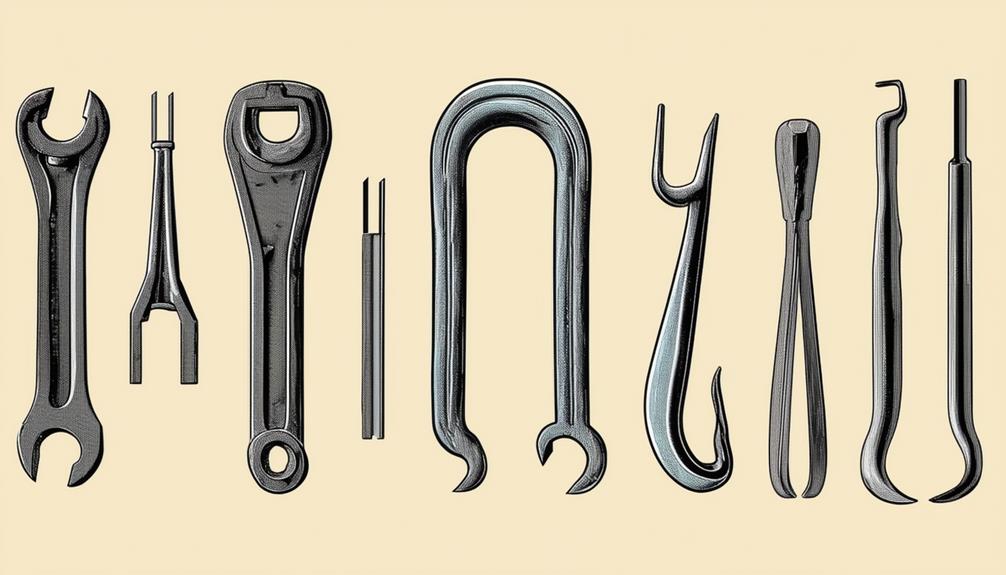
To find the best expert lock picking tools for your needs, it's essential to understand the specific features and qualities that set them apart. Expert lock picking tools are designed with precision and durability in mind, often detailed in guides on advanced lock picking techniques.
Look for tools made from high-quality materials such as stainless steel or titanium, ensuring longevity and reliability during use. Expert lock picking sets often include a variety of tension wrenches, different hook picks, and rakes to provide flexibility when tackling different types of locks.
When choosing expert lock picking tools, consider options with ergonomic handles for comfort during long picking sessions. Additionally, select tools with a slim profile to access tight keyways easily.
Advanced lock picking kits may also include specialty tools like dimple picks and tubular lock picks for challenging locks. Remember that quality tools can make a significant difference in your success rate when picking locks at an expert level.
Prioritize precision, durability, and versatility when selecting your expert lock picking tools.
Factors to Consider for Beginners
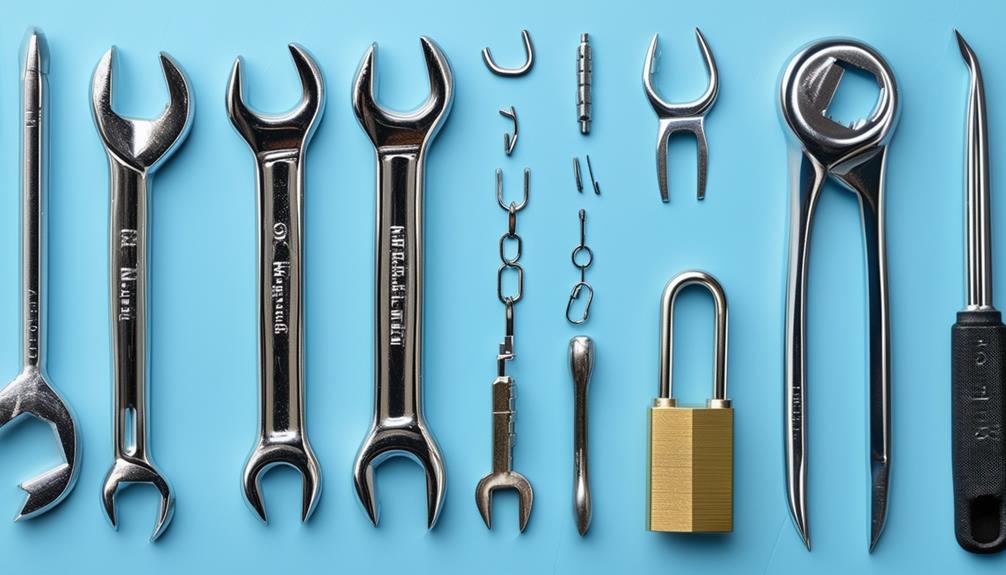
Newcomers to the world of lock picking often face the challenge of selecting the right tools to begin their journey. When considering lock picking tools as a beginner, it's essential to keep a few key factors in mind to guarantee a smooth start to your practice.
Understanding the fundamentals of lock picking will provide a solid foundation for your skills, as it highlights the importance of knowing different lock mechanisms and their vulnerabilities, helping you make informed decisions about your tools. Additionally, exploring crafting and utilizing tools can inspire creativity and resourcefulness in your practice.
- Simplicity: Opt for beginner-friendly tools that are easy to handle and understand. Complex tools designed for experts may overwhelm you at the beginning.
- Versatility: Choose a set of tools that offer a variety of options for different types of locks. This will allow you to practice on a range of locks as you progress from a beginner to an intermediate level.
- Durability: Invest in tools made of high-quality materials to guarantee they last through your learning process. Beginner tools should withstand regular use without losing effectiveness.
- Guidance: Look for beginner tool sets that come with instructional materials or access to online tutorials. This will help you understand the basics of lock picking and improve your skills efficiently.
Factors to Consider for Intermediates
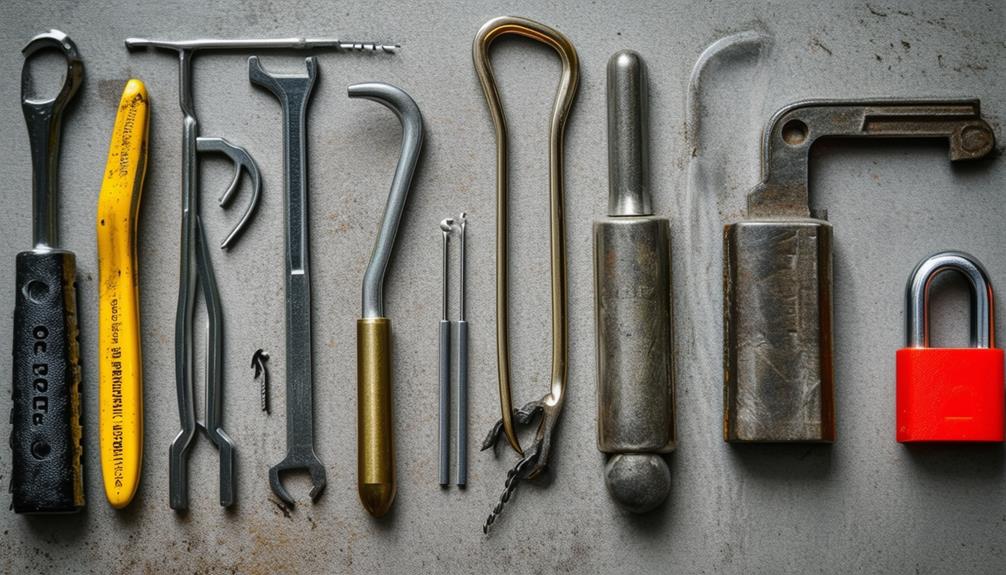
Assess your skill level honestly to determine the complexity of tools you can handle.
Beginners often benefit from affordable lock picking tools that allow them to practice without breaking the bank.
Consider the versatility of tools to guarantee they can be used across a range of lock types.
These factors are essential for intermediates looking to advance their lock picking abilities.
Skill Level Assessment
When determining the appropriate lock picking tools for your skill level, it's crucial to assess key factors that cater to intermediate locksmiths.
As an intermediate practitioner, you should consider the following:
- Experience Level: Evaluate your proficiency in picking various types of locks to determine the complexity of tools needed.
- Skill Development: Reflect on your progress in mastering different techniques to gauge the range of tools suitable for further advancement.
- Comfort with Tools: Assess your familiarity with a variety of tools and identify areas where you may need to expand your expertise.
- Lock Types Encountered: Consider the types of locks you commonly encounter to guarantee your toolset is equipped for these challenges.
Tool Versatility
Considering your position as an intermediate locksmith, the aspect of tool versatility becomes increasingly vital in your selection process. When maneuvering through the vast array of lockpicking tools available, it's important to opt for versatile options that can handle a variety of lock types and situations.
Here is a breakdown of key considerations for tool versatility in your lockpicking tools guide:
| Versatility Factor | Description |
|---|---|
| Multiple Tension Tools | Different sized tension tools allow for better control and manipulation of various lock mechanisms. |
| Diverse Pick Set | A set with a range of picks like hooks, rakes, and diamonds provides flexibility to tackle different lock types. |
| Adjustable Handles | Interchangeable or adjustable handles offer customization for ease of use and comfort during long picking sessions. |
| Specialized Tools | Tools with specialized functions like key extractors or bump keys add versatility to handle unique lock situations. |
| Compact Tool Kit | A compact kit with a variety of tools guarantees portability and readiness for different lockpicking scenarios. |
Confirming your tools cover these aspects of versatility will enhance your ability to tackle a wide range of locks effectively.
Factors to Consider for Experts
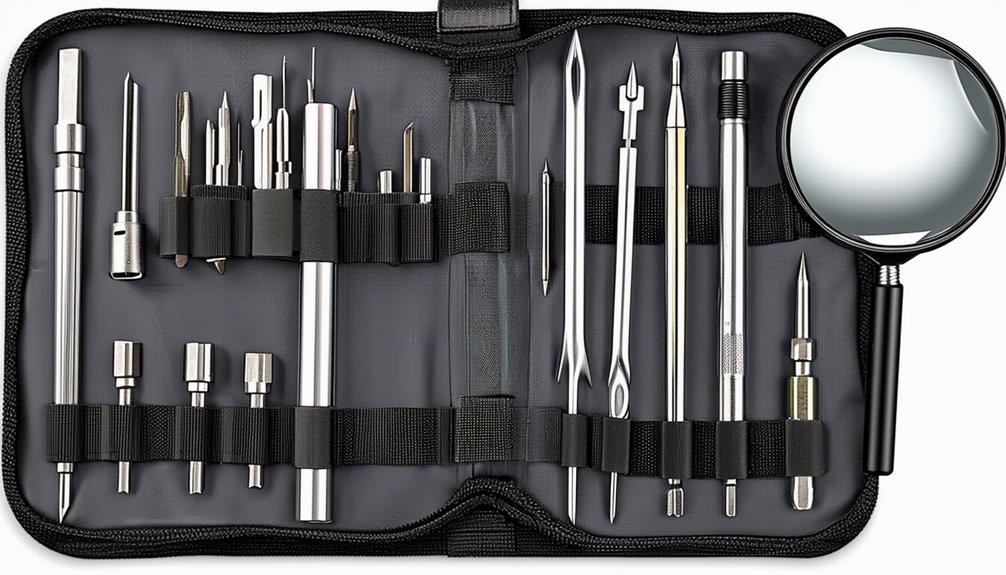
To excel in lock picking as an expert, you must carefully evaluate the durability and quality of your tools.
As an expert, your proficiency in lock picking demands a higher level of precision and finesse, making the choice of tools even more critical.
Investing in the right tools not only enhances your skill but also greatly improves your efficiency during security testing, especially when using essential tools for effective lock picking.
Here are some factors to take into account when selecting lock picking tools tailored to your expertise:
- Material Quality: Opt for tools made from high-quality materials like stainless steel to guarantee durability and longevity.
- Variety of Picks: Choose a set that offers a wide range of pick types and sizes to tackle different lock mechanisms effectively.
- Tension Tools: Invest in high-quality tension tools that provide the right amount of control and feedback during the picking process.
- Ease of Use: Select tools that are comfortable to hold and maneuver, allowing you to work with intricate locks more efficiently.
Conclusion and Next Steps
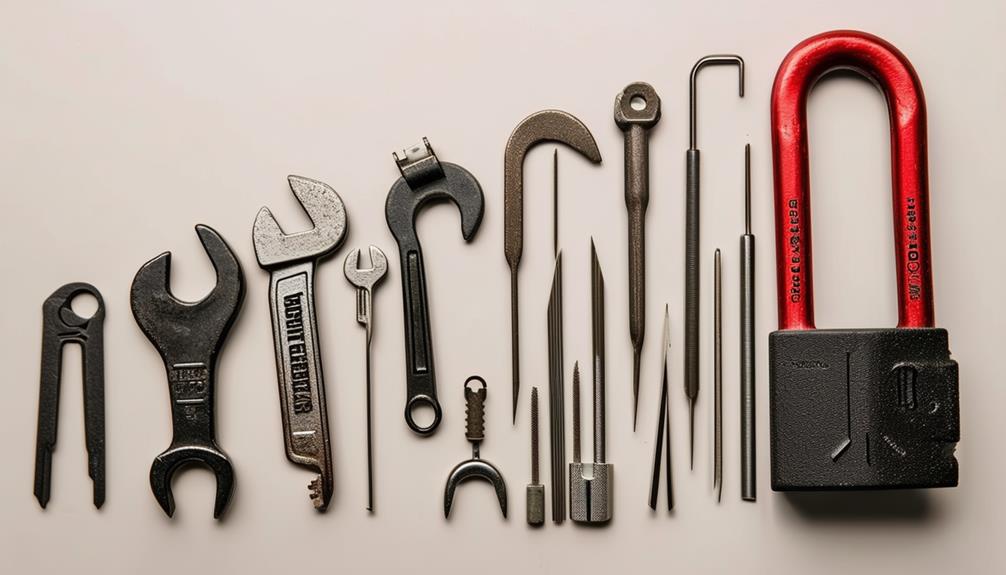
As you conclude your evaluation of lock picking tools tailored to your expertise, it is essential to reflect on the vital factors discussed. Throughout this guide, we have explored the importance of selecting the right tools based on your skill level. Remember, having the essential lockpicking tools is vital for a successful experience. Moving forward, here is a table summarizing the key tools you should consider for your lock picking kit:
| Essential Lockpicking Tools | Description |
|---|---|
| Lock Picks | Variety of picks for different locks |
| Tension Wrench | Applies turning pressure to the lock |
| Rake Picks | For quick manipulation of pins |
| Hook Picks | Allows precise pin positioning |
| Key Extractor Tool | Helps in removing broken keys |
Use this table as a reference point when assembling your lock picking tools. Remember to practice ethical lock picking and always stay within legal boundaries. With the right tools and skills, you can continue to hone your craft in the fascinating world of lock picking.
Frequently Asked Questions
Can Lock Picking Tools Be Used for Illegal Activities?
Yes, lock picking tools can be misused for illegal activities.
It's vital to understand that while these tools have legitimate purposes like locksmithing or home security, they can also be exploited for unlawful actions.
Always guarantee you use lock picking tools responsibly and lawfully.
Remember, engaging in illegal activities can lead to serious consequences and harm others.
Stay ethical and respect the law when it comes to lock picking tools.
Are Lock Picking Tools Legal to Own in All Countries?
In most countries, owning lock picking tools is legal, but their usage may have restrictions.
For example, in the United States, it's generally legal to possess these tools unless there's intent to commit a crime.
Some states have specific laws regulating their possession.
It's important to research and understand the laws in your area to make sure you stay within legal boundaries when owning lock picking tools.
How Do I Maintain and Clean My Lock Picking Tools?
To maintain and clean your lock picking tools, start by wiping them down after each use with a cloth.
Avoid excessive force to prevent damage.
Periodically lubricate moving parts with a light oil.
Store them in a dry place to prevent rust.
Inspect tools for wear and replace if needed.
Regular maintenance guarantees your tools stay in top condition for when you need them most.
Can Lock Picking Tools Damage the Locks I Practice On?
When picking locks, using improper tools can indeed harm the locks. It's essential to select the right tools to avoid damaging the mechanisms.
Remember, "a stitch in time saves nine." By choosing quality lock picking tools suited to your skill level, you'll prevent unnecessary wear and tear on the locks you practice on.
This guarantees both your tools and the locks remain in good condition, allowing you to continue honing your lock picking skills effectively.
Are There Any Certifications for Lock Picking Proficiency?
Yes, there are certifications for lock picking proficiency.
These certifications can validate your skills and expertise in the field. They demonstrate your knowledge and ability to effectively pick locks.
By obtaining these certifications, you can showcase your proficiency to potential clients or employers.
Consider pursuing these certifications to enhance your credibility and showcase your expertise in lock picking.
Conclusion
In summary, when selecting the best lock picking tools for your skill level, remember to evaluate the factors of finesse, familiarity, and functionality. Find tools that fit your level of expertise, improve your proficiency, and enhance your performance. By carefully choosing the right tools, you can access new opportunities and conquer challenging locks confidently. Happy picking and may your skills soar to new heights!

